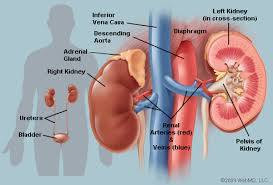The Importance of Early Detection of Kidney Diseases
Kidney disease can be considered a silent killer that
affects millions of people worldwide. In India alone, around 17% of the
population suffers from chronic kidney disease. The alarming fact is that most
people are not aware of their condition until it reaches an advanced stage.
Early detection is essential to prevent kidney disease from progressing and
causing irreversible damage.
Why is early detection of kidney disease important?
Kidneys are bean-shaped vital organs that play a significant
role in filtering toxins and waste products from the human body. When such
important parts of our body are not functioning properly, waste products and
excess fluids build up in the body, leading to complications such as high blood
pressure, anaemia, bone disease, and nerve damage.
Early detection allows doctors to identify kidney problems
in their early stages, enabling them to treat the disease effectively. Early
treatment can slow down the progression of kidney disease, preventing further
damage to the kidneys. It can also reduce the risk of complications such as
heart disease and stroke.
Who is at risk for kidney disease?
There are certain factors that increase the risk of
developing kidney disease, including:
Diabetes: High blood sugar levels in your body can
cause harm to the blood vessels in the kidneys, leading to kidney disease.
High blood pressure: High blood pressure levels can
cause harm to your blood vessels in the kidneys, leading to kidney disease.
Your pedigree: If someone in your family has ever had
a kidney disease, chances are that you can also develop such a condition.
Age: As we age, the risk of developing kidney disease
increases.
Smoking: Smoking increases the risk of kidney disease
and other health problems.
If you are familiar with any of these factors, it is
essential to get regular check-ups with a nephrologist.
How is kidney disease diagnosed?
A nephrologist can diagnose kidney disease through a
combination of blood tests, urine tests, and imaging tests. The blood test
calculates the level of creatinine in the blood, a waste product that the
kidneys should filter out. Spiked levels of creatinine indicate that the
kidneys are not functioning properly.
The urine test checks for the presence of protein in the urine, which is
another sign of kidney damage. Various imaging tests such as ultrasound, CT
scan, or MRI can help identify any abnormalities in the kidneys.
If kidney disease is diagnosed, the nephrologist in Hiranandani
Hospital Kidney Care will determine the stage of the disease and
develop a treatment plan based on the severity of the condition.
What are
the treatment options for kidney diseases?
The kidney disease treatment depends on the stage and
severity of the disease. In the early stages, lifestyle changes such as a
healthy diet and exercise can help slow down the progression of the disease.
Medications and physical exercises to control blood pressure and blood sugar
levels can also help protect the kidneys.
As kidney disease progresses, more advanced treatments such
as dialysis or kidney transplant may be necessary. Hiranandani Hospital Kidney
is renowned for its successful kidney transplant program, providing a new lease
of life for patients suffering from end-stage renal disease. The hospital's
team of experienced nephrologists and transplant surgeons work together to
ensure the best possible outcomes for their patients.
Apart from kidney transplants, Hiranandani Hospital's kidney
care team provides comprehensive care for patients with kidney diseases. The
team works towards preventing kidney disease progression, managing symptoms,
and minimizing
complications. The hospital also offers advanced diagnostic and
treatment options, including dialysis and renal replacement therapy.
What can
you do to protect your kidneys?
Some steps that you can take to protect your kidneys:
Maintain a healthy diet: A diet low in sodium and
saturated fats and rich in fruits and vegetables can help protect your kidneys.
Stay hydrated: Drinking plenty of water helps you to
release toxins from the body and keeps the kidneys functioning properly.
Exercise regularly: Regular exercise can help control
blood pressure and maintain a healthy weight, reducing the risk of kidney
disease.
Manage underlying health conditions: If you have
diabetes, high blood pressure, or any other underlying health condition, work
with your doctor to manage it effectively.
Get regular check-ups: Regular check-ups with a nephrologist
can help detect kidney disease early and prevent complications.
In conclusion, early detection is critical when it comes to
kidney diseases. If you have any risk factors for kidney disease, it is
important to get regular check-ups with a nephrologist. Hiranandani
Hospital kidney transplant team provides comprehensive care for
patients with kidney diseases, including advanced diagnostic and treatment
options. By taking steps to protect your kidneys, you can help prevent kidney
disease from progressing and enjoy a healthy life.
.png)


Comments
Post a Comment